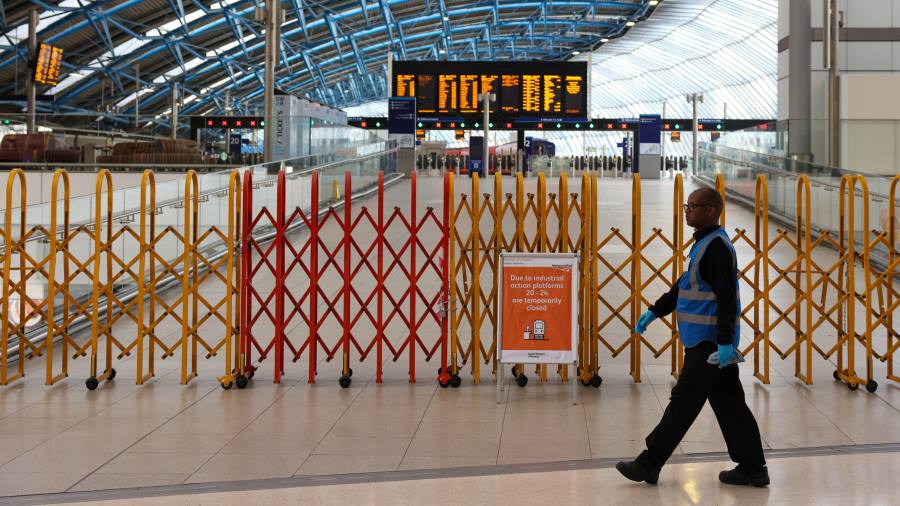Rail passengers in Britain face a new wave of disruption after two unions announced plans for 24-hour stoppages in September in a long-running dispute over pay and conditions.
Train drivers’ union Aslef on Wednesday said its members would stage the third one-day walkout at 12 train operating companies on September 15 in a move that is expected to close down large parts of the network. The announcement is part of a series of stoppages by train drivers who voted for their first national strike since 1995 earlier in the summer.
Separately, the smaller Transport Salaried Staffs’ Association announced its own 24-hour strike from midday on September 26 in a dispute with nine train operating companies and infrastructure owner Network Rail.
The previous strikes by train drivers have all but brought the network to a standstill but rail industry executives are confident that a TSSA strike would have a far smaller impact unless it was timed to coincide with a walkout by another union.
The RMT, which has 40,000 members including key signalling staff, has threatened to call more strikes this autumn but has yet to announce any dates.
The latest strikes called by Aslef and the TSSA follow a summer of disruption on the railways as workers push for pay rises to match soaring inflation.
Unions have said the action is also in part to protect their members’ jobs and working practices. But train companies and Network Rail have countered that the only way to afford significant pay rises within their budgets is through higher staff productivity.
The government controls the industry’s finances and is pushing for cost cuts to help plug a £2bn annual funding gap following a fall in ticket revenue after the pandemic.
Since the dispute began earlier in the summer, only one pay deal has been agreed when a small number of TSSA members accepted a 4 per cent rise from Network Rail. Separately, Aslef has reached pay deals with nine train companies without resorting to strike action.
Mick Whelan, Aslef’s general secretary, said there was still no pay offer on the table from train operating companies, leaving his members facing a real-terms pay cut. “We want the companies . . . to make a proper pay offer to help our members keep up with the increase in the cost of living,” he said.
Manuel Cortes, TSSA’s general secretary, blamed the government for the impasse. He called on the industry to propose a new pay offer after an “insulting” 2 per cent pay rise was rejected earlier in the summer.
The government called on unions to restart talks with the rail industry, and said strike action would be “self-defeating”.
“These reforms deliver the modernisations our rail network urgently needs, are essential to the future of rail, and will happen. Strikes will not change this,” the government said.
Transport secretary Grant Shapps has repeatedly called on unions to accept sweeping modernisation, such as more flexible shift patterns and making Sunday a regular part of the working week, in exchange for pay rises.
He has also previously called on the RMT to put a rejected pay offer from Network Rail, equivalent to a pay rise of 8 per cent over 2 years, to a member vote.
With Network Rail insisting that its offer is all it can afford, talks are deadlocked, with both industry executives and unions expecting more strikes in the autumn.
Services affected by the Aslef walkout include those operated by Avanti West Coast, Great Western Railway, LNER, Northern Trains and Transpennine Express.


